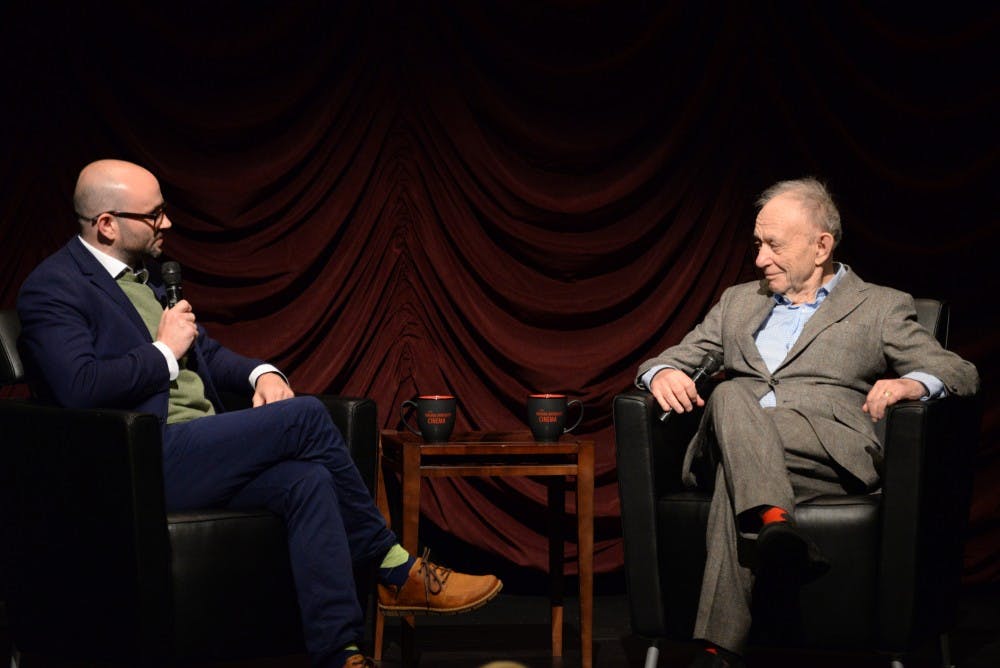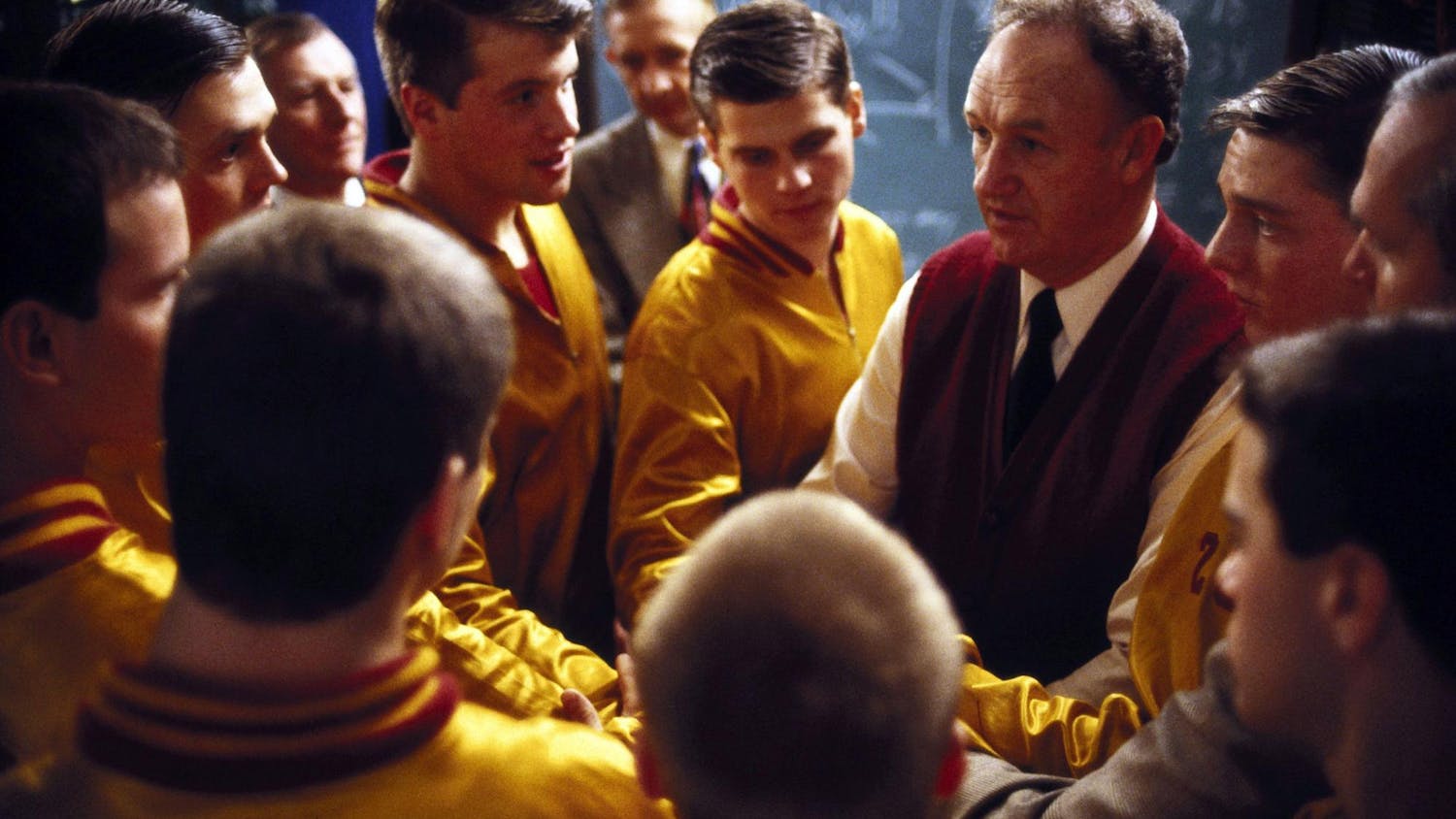Legendary documentarian Frederick Wiseman sat down with emerging filmmaker Robert Greene at the inaugural “Filmmaker to Filmmaker: Conversations from the Director’s Chair” on Wednesday night at the IU Cinema.
The series is meant to allow a younger filmmaker to moderate a discussion with a veteran, and in the documentary film industry, it doesn’t get much more “veteran” than Frederick Wiseman.
The renowned documentarian’s career has spanned 50 years, beginning with “Titicut Follies” in 1967, a film about a state prison for the criminally insane. Believe it or not, it has been adapted into “Titicut Follies: The Ballet,” which opens later this month in New York City.
Wiseman’s idea for his ongoing institutional documentary series stemmed from this first film. He told Greene his sophomore effort, “High School,” “seemed like a logical follow-up to a prison for the criminally insane.”
While casual fans of documentary film may have only seen these first few — and most famous — of Wiseman’s films, fellow filmmaker Greene is no newcomer. He kicked off the interview Wednesday night by confessing he and his wife have watched 38 of Wiseman’s 43 films.
Greene quickly proved himself well-versed in Wiseman’s filmography, and they spent a good portion of the evening referencing specific shots and sequences from films like “Welfare,” “Belfast, Maine” and “La Danse.”
The two filmmakers have differing styles — Wiseman is a master of observational documentary, while Greene tends to take a more experimental and genre-blurring approach — but both filmmakers found plenty of common ground during their conversation.
One thing the two men share, Greene said, is that neither of them consider documentary film to be social activism or journalism. Wiseman then took the idea further by claiming that he doesn’t even necessarily see his films as documentaries.
“They’re just movies,” Wiseman said, explaining that he sees his films as works of fiction. Greene agreed, proposing that their mutual experience with editing contributes to this heightened awareness of the film’s construction.
“The idea of documentary comes from the Ex-Lax tradition,” Wiseman said. “It’s supposed to be good for you. You automatically think you’re going to be taught a lesson, and that it’s going to be dull. And I don’t think it has to be that way.”
Greene added, “They’re complicated responses to complicated people, and that is antithetical to the idea that watching these are supposed to be good for you." He continued, "I think editors often retreat from the word documentary faster than anyone, because we know when we’re cutting this material together just how much construction there is. We know the tricks that we’re playing.”
Greene said that he doesn’t trust documentary filmmakers who don’t talk about construction and artificiality. If a documentary filmmaker admits that he is making it up as he goes, just as much as any fiction filmmaker, he sees that as being more honest about the whole process.
Amid the discussion of fictionality in their films, Greene and Wiseman emphasized the role that everyday life plays in their processes.
“One of these things that makes these films possible is that there is an enormous amount of drama and sadness and comedy and tragedy in ordinary experience,” Wiseman said, explaining that he would never fabricate a scene in one of his films.
According to him, it’s all about being in the right place at the right time, with the camera running.
“There are sequences in some of my films that you’d have to be Dostoyevsky to write. And I’ve just been lucky enough to be there.”
Toward the end of the night, Greene brought up a rumor that Wiseman had lent a print of his army documentary “Basic Training” to Stanley Kubrick before the making of “Full Metal Jacket.” Why? Because, as Greene pronounced, “That movie is a rip-off of ‘Basic Training.’”
Wiseman wasted no time setting the record straight — which isn’t to say that he denied Greene’s claim.
“Well, I didn’t give it to him,” Wiseman said. “I got a call one day: ‘This is Mr. Kubrick’s secretary. Mr. Kubrick would like to see ‘Basic Training.’ So Mr. Kubrick’s secretary was told that he could rent ‘Basic Training.’ And so he rented it.”
To the delight of the audience, Wiseman went on to explain that Kubrick kept the film for a year, despite “frequent letters and phone calls.” After the print was finally returned, Wiseman went to see “Full Metal Jacket,” and immediately saw why he didn’t get the print back for so long.
“The first half of the movie is — many of the shots, not all of the shots — are recreations of sequences from ‘Basic Training,’” Wiseman said.
“Is there a credit that says, ‘Thank you to Frederick Wiseman?’” Greene asked.
“Of course not,” Wiseman replied. “I was just glad that a real filmmaker had used my material.”




